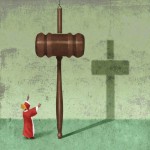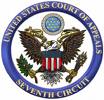Catholics on the Court
 Three recent events have added a new wrinkle to a debate that has been taking place among legal scholars: what, if anything, does it mean to be both a Catholic and a Supreme Court Justice?
Three recent events have added a new wrinkle to a debate that has been taking place among legal scholars: what, if anything, does it mean to be both a Catholic and a Supreme Court Justice?
First, the confirmation of Justice Sonia Sotomayor has added a sixth practicing Catholic to the Supreme Court. As a proportion of the Court’s membership, Catholics on the Court currently exceed their proportionate representation in the general public by a significant amount. This is an astonishing historical fact, although its significance is not self-evident.
Second, Frank Colucci’s book, Justice Kennedy’s Jurisprudence, was recently reviewed in the Wall Street Journal by Northwestern University Law School Professor John McGinnis. Apparently, Mr. Colucci does not adhere to the conventional wisdom that Justice Kennedy is an unpredictable jurist whose primary concerns are the aggrandizement of the Supreme Court and the divination of narrow, fact-based holdings. Instead, and somewhat unexpectedly, Corlucci argues that Justice Kennedy’s approach to the interpretation of the Constitution is best understood as seeking to advance a moral imperative.
Justice Kennedy’s objective, according to Corlucci, is to vindicate and preserve an ever increasing share of individual liberty within our broader society. Here is the key portion of Professor McGinnis’ review:
Looking for the sources of Justice Kennedy’s moral judgment, Mr. Colucci discovers one in post-Vatican II Catholic thought, including papal encyclicals like Dignitatis Humanae. In Roper v. Simmons, a ruling forbidding the death penalty for criminals under the age of 18, Justice Kennedy wrote that juveniles only rarely exhibit ‘irreparable corruption’ – a phrase that a secular judge might not have used. (Justice Kennedy is an observant Catholic). It is odd to reflect that the justice most influenced by contemporary Catholic thought may today be – because of his emphasis on individual rights – the decisive vote for preserving the abortion status quo.
It is intriguing to consider whether there is, in fact, a demonstrable connection between Catholic social thought and Justice Kennedy’s interpretation of an evolving liberty interest guaranteed by the Constitution.

 Since separate state and federal prosecutions are permissible for the same criminal act, federal law appropriately permits district judges to impose federal sentences so that they run concurrently with states sentences; that way, defendants can be protected from what would otherwise amount to double punishment for the same crime. But what if federal prosecution is delayed, and the state sentence has already been served by the time sentencing occurs in federal court? The federal sentence cannot be made concurrent in those circumstances. Is it permissible then for the district judge to reduce the federal sentence length in light of the missed opportunity for a concurrent sentence?
Since separate state and federal prosecutions are permissible for the same criminal act, federal law appropriately permits district judges to impose federal sentences so that they run concurrently with states sentences; that way, defendants can be protected from what would otherwise amount to double punishment for the same crime. But what if federal prosecution is delayed, and the state sentence has already been served by the time sentencing occurs in federal court? The federal sentence cannot be made concurrent in those circumstances. Is it permissible then for the district judge to reduce the federal sentence length in light of the missed opportunity for a concurrent sentence?